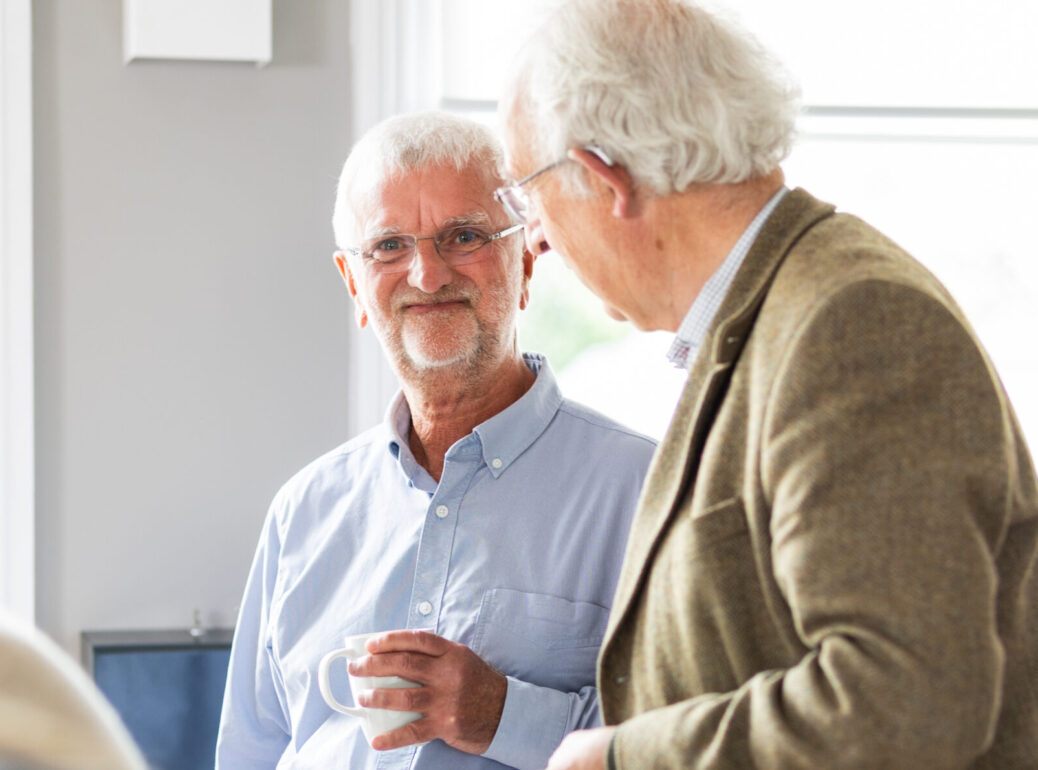
We spoke to Barnwood’s new Chair, Colin Smith
Colin Smith began his new role as Chair of Trustees for Barnwood on 21st May. We took the opportunity to talk with Colin about this role and what it means to him.
Please could you introduce yourself, tell us about your background and experience ?
Hello, yes of course. I am a Chartered Surveyor. I qualified in the 1970s and worked in bo th the public and private sector in Gloucestershire, Somerset and London. In the 1980s, when I was the Gloucestershire Deputy District Valuer, and then again in the 1990s during my time as a partner with Bruton Knowles, I came across Barnwood Trust when some of its land became part of what is now Abbeydale and Abbeymead and of course the Barnwood business park estate development.
th the public and private sector in Gloucestershire, Somerset and London. In the 1980s, when I was the Gloucestershire Deputy District Valuer, and then again in the 1990s during my time as a partner with Bruton Knowles, I came across Barnwood Trust when some of its land became part of what is now Abbeydale and Abbeymead and of course the Barnwood business park estate development.
My ‘hands on’ involvement with Barnwood Trust began in 2017 as a Governor. This was my first step into direct experience in the charity sector.
What made you want to get involved with Barnwood Trust?
I’ve lived and worked in Gloucestershire and enjoyed all it has to offer for nearly 50 years. I am committed to doing whatever I can to help make it a better place for everyone.
The Trust has significant assets, a highly motivated professional team and the ability to identify and interpret data about need in the county and to understand impact. Barnwood Trust is uniquely placed in terms of what it can provide and enable, working alongside disabled people and people with mental health conditions and other organisations which provide support. Actions to ensure the Trust’s funds are distributed and applied to best effect is immensely rewarding.
Can you say more about the role you have played at Barnwood Trust?
To begin with, my Trustee role was focussed on the development proposals for the Manor Gardens site in Barnwood Road Gloucester. In early 2020, having finally secured planning permission for a specialist disability and community living development, the Board decided to sell the site. This decision to not undertake the development ‘in-house’ was due to both the extent to which Trust resources would be committed to the project and the immediate challenges and the significant impact which arose from the Covid pandemic. As is often the way with development schemes, the sale has taken a considerable time to finalise, but I am pleased to say it has now completed.
Since early 2023, I have chaired Barnwood Trust’s newly created Funding Committee with a focus on supporting organisations which serve disabled people and people with mental health conditions in the county, and facilitating partner organisations to give grants to individuals effectively on the Trust’s behalf.
As Chair of Trustees, I see my role as helping enable the Board in its leadership of the strategic direction of the Trust over the next few years, as well as ensuring continued sound governance.
Have there been any key learnings in your time with the Trust?
During 2021 and 2022, I contributed to the report which the Trust prepared on its late 18th and early 19th Century history about its connections with the slave trade, which included links to people who benefitted financially from the inhuman trade and were financially compensated when abolition was secured. Thinking about the role of Barnwood Trust today in responding to inequalities and injustices experienced as a legacy of our national history is an important priority for the Trust.
Research undertaken into Barnwood’s origins also provided insights into the aspirations of the day to ‘provide’ for the ‘mentally ill’. Barnwood Hospital (as it then was) practice and approaches were at the forefront of change on how those who experienced mental health conditions were helped and treated during the 19th and early 20th century. This commitment and boldness is, in some ways, foundational for what Barnwood Trust is today – creating and supporting positive change in the face of significant challenge.
What is the value of Barnwood’s work in Gloucestershire and beyond?
I believe the Trust shares and contributes thought leadership to evolve best practice in many aspects if its work. Notable examples include Barnwood’s expertise in involving people with lived experience, interpreting data, effective grant funding, and ethical and social enterprise investment. And Barnwood actively participates with national organisations, such as the Association of Charitable Foundations. In doing so Gloucestershire benefits from Barnwood’s experience and learning, with an emphasis on collaboration to identify and resource changes needed.
What are your hopes for your role as Barnwood’s Chair?
I would like to see us maintain and develop our activities so that a wide range of disabled people and people with mental health conditions benefit from what the Trust does.
A part of this, in my role, is to champion and develop the highly motivated and talented Barnwood Trust team.
It is a welcome challenge for me to build on the significant progress and achievements of the Trust during Ann Santry’s time as Chair – along with the team and the rest of my colleagues on the Board, I am absolutely committed to do my best for the task ahead.
To find out more about Barnwood’s work visit www.barnwoodtrust.org/what-we-do